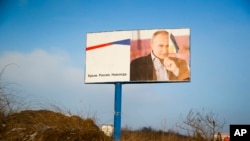The European Union on Saturday published details of its decision extending sanctions against Russia for its 2014 takeover of Ukraine's Crimean Peninsula, saying it continues to oppose the "illegal annexation ... and does not recognize it."
The extended penalties include asset freezes and visa bans against nearly 150 Russians and 37 entities that the EU's statement described as "responsible for action against Ukraine's territorial integrity."
An official EU journal said the penalties include bans on a range of imports and products produced in Crimea and the Black Sea port of Sevastopol. They will remain in effect until June 23, 2017.
The measures block European investment in those territories, ban any European purchases of real estate and prohibit European financing of Crimean companies.
Banned European exports target Crimea's transport, telecommunications and energy sectors.
Speaking Friday at a forum in Russia's St. Petersburg, President Vladimir Putin criticized the sanctions for damaging Russian-European relations. Moscow is willing to improve business ties with Europe, Putin said, but the EU must meet his government halfway.
A first wave of Western sanctions against Russia was imposed in July 2014, after analysts linked the downing of a Malaysian jetliner over Ukrainian territory to Russian-made missiles. All 298 people on board perished.
Both Brussels and Washington have since targeted Russia's banking sector and blocked Russian energy companies from access to services, goods and technology used in deep-water shale oil extraction.
Russia's annexation of Crimea in March 2014 came just weeks after pro-Western demonstrators in Kyiv forced Russian-leaning President Viktor Yanukovych to step down. One month after the annexation, pro-Russian rebels in eastern Ukraine launched a rebellion against the central government in Kyiv.
The United Nations says more than 9,000 civilians, soldiers and separatists have been killed since then.





